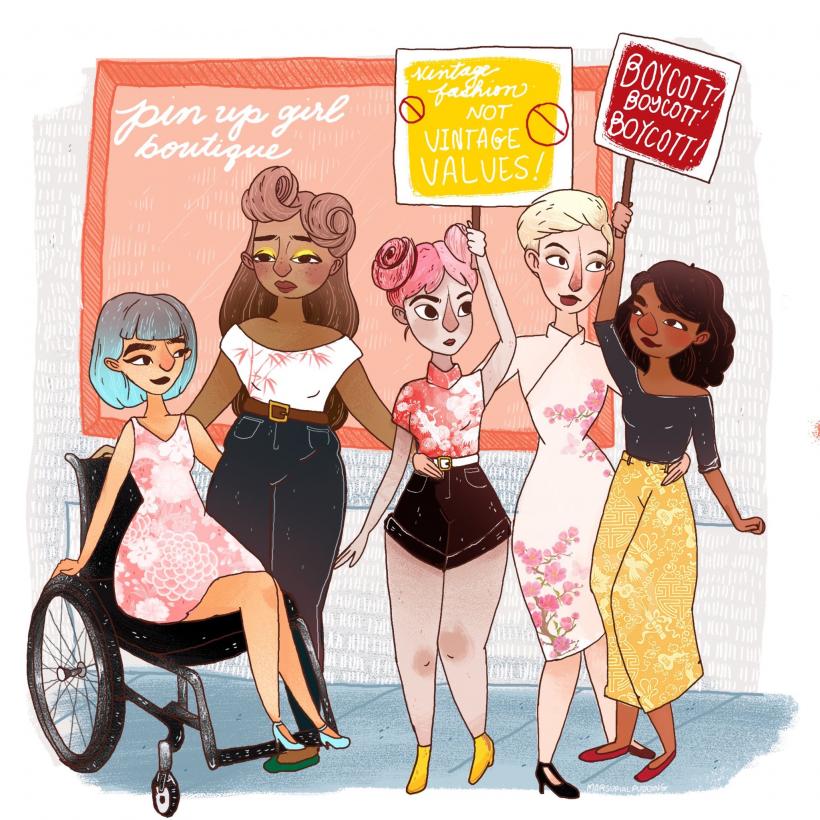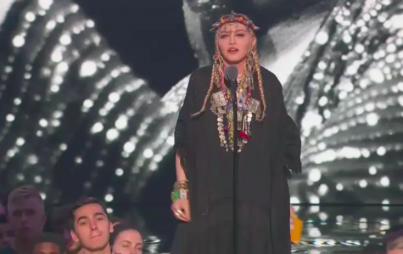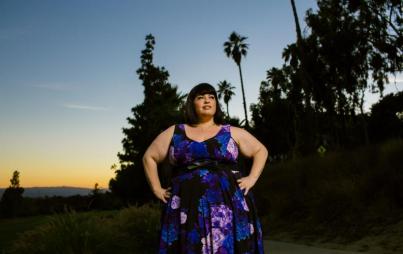
image credit: Ashleigh Walker of @MarsupialPudding
Have we all been problematic in the past? Oh hell yes. I know I have.
Being a marginalized woman doesn't absolve you of the guilt of marginalizing other marginalized cultures. My 90's love of anything "Far East" inspired has me giving my younger self the double side eye. I still don't know the verdict on whether non-Asians should touch kimonos because God knows I love them. But that's neither here nor there because the appropriation of other people's culture isn't actually about my stupid feelings. I know, right?
But it needs to be said because not everyone gets it. Not your culture? HANDS OFF. Oh yeah, and all our 90's faves are problematic — all of them. It was a time ripe for cultural appropriation. The only difference is some of us feel mortified by it and talk about it, and some of us refuse to acknowledge it. But we have to acknowledge it, apologize, and grow. That's how progress is made. Sure, it is mortifying. But as I've said before: if you know better ... do better. Which is why it is so egregious when a brand as large as Pinup Girl screws up in such a monumental way and then attempts to silence those that take them to task and hold them to a higher standard. If you ran a company, wouldn't you want people to hold you to the highest of standards? I know I would.
As I was reading the story of Jenny Baquing's petition, I felt my stomach clench up in that way that only subtle racism can do for me. But when I went to Pinup Girl’s Instagram and saw pictures from the Women's March and a sign proclaiming to love Muslims, I had to ask if they would love Muslims if Muslim women told them they were offensive and begged them to change their ways. Would they fight for their rights if it wasn't trendy and so obviously on the right side of history at the moment? Well, if you're silencing women who are telling you that you are in the wrong, I think we all know the answer to that question.
I first met Jenny Baquing through the internet like so many of my friendships. Baquing immediately stood out to me as someone who has consistently had the backs of black women and other women of color, as we grew in numbers on Twitter and faced racist trolling for sharing our truth. I quickly warmed to her, and let's be honest as a visual person — Jenny is a dream. Her clothing shoots are glorious and include a variety of bodies and sizes. She is a person in the fashion world who stands by her convictions and is dedicated through and through to creating long lasting change and carving out room for color. So when I heard about the recent backlash that hit the clothing maker Pinup Girl clothing, I was not at all surprised to see that one of my amazing friends was behind it.
Why is it just so hard to apologize? Why is it so hard for Pinup Girl to realize they made a mistake and make amends? It wouldn't even be hard. Yes, you stand to lose money in the offensive clothing you chose to manufacture, but at this point, you chose that over your reputation. And let me tell you, good news spreads quickly. One of my favorite quotes from Baquing that I found while researching this piece is, “Remember; the system is bullshit. Let's point it out."
When did you first reach out to Pinup Girl about cultural appropriation in their clothing and what was their reaction?
On January 23rd, I saw Pinup Girl Clothing’s post about their Chinese New Year collection for the first time. I immediately started seeing red. Someone posted photos and advertisements for the collection in one of the WoC groups I am part of on Facebook, and it was clear that all my peers were similarly outraged. A lot of the problems were obvious, too. No Asian models. A dragon print, to celebrate the Year of the Rooster. Colors that don’t symbolize celebration in Chinese culture at all. It was a complete mess of poor choices and mistakes.
Shortly after seeing the post, I took to Twitter (as I am known to do) to voice my feelings. I tweeted at the company account for PUG and the CEO/ designer of the brand, Laura Byrnes. I spoke out about the collection in a long thread, with tweets spread out throughout the day, but they didn't respond. So, the next day, on January 24th, I found Laura’s e-mail on her public Instagram profile and reached out to her privately.
The conversation immediately went sour. Laura was condescending, she ignored my repeated requests for a public apology, and she wrote awful deflections and excuses, like trying to equate appropriating Asian culture to producing a replica of a Josephine Baker skirt. The more she wrote to me, the more she revealed her ignorance, and it became really clear she was someone who had no interested in adjusting her white viewpoint. To be honest, I don't know why Laura even responded to my e-mail, as she was completely uninterested in listening to me — or the many WoC who had tried to talk to her before me.
Why do you think companies like this double down when faced with constructive criticism from women of color?
No one likes to be told that they are wrong, but I think it is especially hard for white women to admit that they need to change. Mainstream feminism is championed by white people, which is the kind of feminism that is often silent when it comes to black, native, and PoC issues as a whole. That’s the kind of feminism white women (and companies like this) subscribe to. They’re taught that simply saying the words "I stand for all women" means they are inclusive. But it's not enough to just say the words.
White women don't like to admit that their feminism is lacking, because admitting that would mean they have to change — change their businesses, their personal worldview, etc.—and that is hard, uncomfortable work. So they don’t do it. White women are raised in bubbles of racial privilege and it's really hard to leave that bubble.
Why is it so hard for problematic companies to apologize? Don’t they stand to gain from not being a problem?
Piggybacking off of what I said to the previous question...
Apologizing — really apologizing — also means changing. You can't say "I'm sorry, we fucked up, we won't do it again," yet keep making the same mistakes over and over again without showing that you’re shit. White feminism is a popular marketing tool because it's so easy to preach the words of equality, to paint a picture of all women as united, holding hands, and accepting each other. It's a feel-good worldview that privileged people can easily relate to, promote, and consume. Once companies admit that this type of feminism is bullshit, they have to do the real work of intersectional feminism, and you know, I just don't think that white women want to work that hard for WoC.
To answer the second part of your question, I think it depends on the definition of "gain." As I saw in the Pinup Girl Facebook Lounge, and as I've seen hundreds of times in my life, there is a large collective of white feminists who see apologizing to WoC for cultural appropriation as "divisive" and "distracting."
There were actually a number of white women who thanked and praised Laura for deleting WoC and for "not feeding the trolls." So, the simple answer would be, yes, companies like PUG would gain if the gain is being defined as taking steps toward total equality and justice. That’s not how they see it. They only see the benefits of keeping the white moderate happy and appeased.
What would you ask that a company like Pinup Girl do, to show the fashion community going forward that they’re dedicated to intersectionality?
With the petition, the Unbothered Woke Babes included seven points that we feel address a broad scope of issues relating to cultural appropriation. With PUG specifically, the main issue is the use of Asian symbols on Western patterns (for example, dragons on a pencil skirt). This is why our petition does not include a section on the reproduction of Asian cultural garments (e.g., cheongsam or kimono) because that would be a different discussion altogether.
As far as what I would ask of Pinup Girl to show that they are committed to intersectionality, they need to collaborate with more outside WoC designers and creative directors. They need to work with designers and creative directors who specifically have a reputation for intersectional feminism, not just token PoC who think #AllLivesMatter is cool. So many times I see calls for diversity in models and marketing, but diversity behind the scenes is equally important. If white-owned companies want to borrow and appreciate symbols from other cultures, people from that culture need to be involved at each stage, throughout the entire process. As a former blogger, I constantly saw how white-owned companies are much more likely to sponsor white bloggers, in addition to working with mostly white models. White supremacy and white feminism are ingrained in every facet of the fashion community, and we feel that it is only by making radical asks, that we will achieve justice.
These are the asks from our petition:
1. PUG returns a percentage of each sale of those pieces to the original culture's community, preferably through monetary contributions to organizations advocating for justice.
2. Exclusively Performers and Models of Color are sponsored with pieces from these collections.
3. PUG advertises in publications by and for WOC.
4. Models photographed in any campaigns for these designs are a majority WOC.
5. Photographs in any campaigns for these designs are produced exclusively by POC photographers and creative directors.
6. White bloggers are not given sponsored pieces from these collections.
7. PUG works with WOC designers on the patterns and prints for these designs, and the design teams are comprised of at least 50% WOC.
Why was it important for you to hand deliver your petition to Pinup Girl’s headquarters?
I came up with the idea of delivering letters in person to Laura prior to making the boycott public because I wanted a physical point of connection with her. I was outraged that Laura dismissed and reduced my group of friends and me to "trolls" and "bullies" who were only out to harass her poor self. She took on the role of white victimhood almost immediately after news of our boycott started leaking onto the Internet. Laura is the head of a well-known vintage reproduction company who uses feminism as a marketing and sales tactic.
She claims that her clothes are for everybody, yet she continually centers and caters to white women. It is clear to me that Laura is only interested in surrounding herself with yes-women, including token PoC, who agree with everything she says. She thinks being told "no" is the same thing as being harassed. It was and is important to me to push back against any and all powerful white women who only use feminism for capital gain, while flippantly marginalizing women of color.
Were you surprised by their owner’s reaction?
Haha. No, not at all. I have never personally experienced a gracious or appropriate reaction from a powerful white woman when she’s called out on her racism. They usually use some rendition of the same formula: gaslighting, playing the victim, and getting stuck on the "intent" of their actions rather than the impact. Even when I personally delivered the letters, Laura treated me like she thought my visit and the letters were funny, like some kind of joke.
What are your hopes for the future of fashion for all women?
I dream of a fashion world that is free from white supremacist beauty standards. That has been the rallying cry of my heart for my entire life, even before I had the right words to describe my experiences. People of Color voices and talents need to be amplified throughout the entire fashion industry. I hope for a time in my life when I can look at a world, free of beauty hierarchy, free of unethical labor, and free of racism, where all people can feel happy with their clothes.
How can people locate you and hear more about your boycott (insert any social media you wish to be shared)?
Boycott : Boycott Pinup Girl Clothing
Instagram : @shelovesdresses
Twitter : @shelovesdresses








